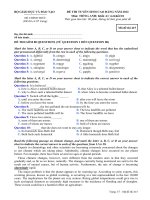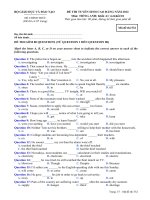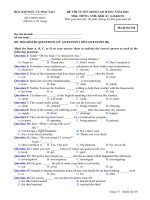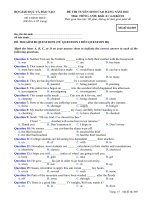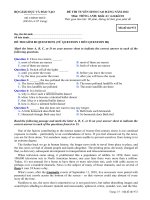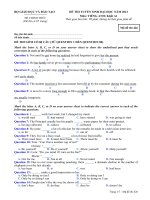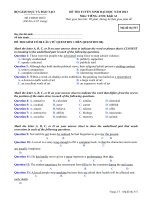DIỄN GIẢI ĐỀ THI TUYỂN SINH CAO ĐẲNG NĂM 2009 MÔN THI: ANH VĂN;(p7)
Bạn đang xem bản rút gọn của tài liệu. Xem và tải ngay bản đầy đủ của tài liệu tại đây (251.94 KB, 7 trang )
DIỄN GIẢI
ĐỀ THI TUYỂN SINH CAO ĐẲNG
NĂM 2009
MÔN THI: ANH VĂN; Khối D1
( Q61- Q80)
---------------------------------
READING COMPREHENSION
PASSAGE 1
Today we take electricity for granted and perhaps we do not realize just
how useful this discovery has been. Steam was the first invention that
replaced wind power. It was used to drive engines and was passed
through pipes and radiators to warm rooms. Petrol mixed with air was the
next invention that provided power. Exploded in a cylinder, it drove a
motor engine. Beyond these simple and direct uses, those forms have not
much adaptability.
On the other hand, we make use of electricity in thousands of ways.
From the powerful voltages that drive our electric trains to the tiny
current needed to work a simple calculator, and from the huge electric
magnet in steel works that can lift 10 tons to the tiny electric magnet in a
doorbell, all are powered by electricity. An electric current can be made
with equal ease to heat a huge mass of molten metal in a furnace, or to
boil a jug for a cup of coffee.
Other than atomic energy, which has not as yet been harnessed to the full,
electricity is the greatest power in the world. It is flexible, and so
adaptable for any task for which it is wanted. It travels so easily and with
incredible speed along wires or conductors that it can be supplied
instantly over vast distances.
To generate electricity, huge turbines or generators must be turned. In
Australia they use coal or water to drive this machinery. When dams are
built, falling water is used to drive the turbines without polluting the
atmosphere with smoke from coal.
Atomic power is used in several countries but there is always the fear of
an accident. A tragedy once occurred at Chernobyl, in Ukraine, at an
atomic power plant used to make electricity. The reactor leaked, which
caused many deaths through radiation
Now scientists are examining new ways of creating electricity without
harmful effects to the environment. They may harness the tides
as they flow in and out of bays. Most importantly, they hope to trap
sunlight more efficiently. We do use solar heaters for swimming pools
but as yet improvement in the capacity of the solar cells to create more
current is necessary. When this happens, electric cars will be viable and
the world will rid itself of the toxic gases given off by trucks and cars that
burn fossil fuels.
Question 61: The author mentions the sources of energy such as wind,
steam, petrol in the first paragraph to______.
A. discuss which source of energy can be a suitable alternative to
electricity
B. emphasize the usefulness and adaptability of electricity
C. suggest that electricity should be alternated with safer sources of
energy
D. imply that electricity is not the only useful source of energy
Question 62: Before electricity, what was sometimes passed through
pipes to heat rooms?
A. Steam. B. Gas C. Hot wind. D. petrol
Question 63: What does the author mean by saying that electricity is
flexible?
A. It is cheap and easy to use B. It is used to drive motor
engines.
C. It can be adapted to various uses. D. It can be made with
ease.
Question 64: What do we call machines that make electricity?
A. Voltages. B. Electric magnets.
C. Generators or turbines. D. Pipes and radiators.
Question 65: The main forms of power used to generate electricity in
Australia are______.
A. wind and gas B. water and coal
C. atomic power and water D. sunlight and wind power
Question 66: The word “they” in the last paragraph refers to______.
A. scientists B. the tides C. new ways D. harmful effects
Question 67: Electric magnets are used in steel works to______.
A. boil a jug of water B. test the steel for strength
C. heat the molten steel D. lift heavy weights up to ten tons
Question 68: The advantage of harnessing the power of the tides and of
sunlight to generate electricity is that they______.
A. are more adaptable B. are more reliable
C. do not require attention D. do not pollute the environment
Question 69: Which of the following power sources causes pollution by
emitting harmful gases?
A. Wind. B. Sunlight. C. Petrol. D. Water.
Question 70: The best title for this passage could be______.
A. “How to Produce Electricity” B. “Why
Electricity Is So Remarkable”
C. “Electricity: Harmful Effects on Our Life” D. “Types of
Power Plants”
PASSAGE 2
If parents bring up a child with the sole aim of turning the child into a
genius, they will cause a disaster. According to several leading
educational psychologists, this is one of the biggest mistakes which
ambitious parents make. Generally, the child will be only too aware of
what his parents expect, and will fail. Unrealistic parental expectations
can cause great damage to children.
However, if parents are not too unrealistic about what they expect their
children to do, but are ambitious in a sensible way, the child may succeed
in doing very well – especially if the parents are very supportive of their
child.
Michael Collins is very lucky. He is crazy about music, and his parents
help him a lot by taking him to concerts and arranging private piano and
violin lessons for him. They even drive him 50 kilometers twice a week
for violin lessons. Michael’s mother knows very little about music, but
his father plays the trumpet in a large orchestra. However, he never
makes Michael enter music competitions if he is unwilling.
Winston Smith, Michael’s friend, however, is not so lucky. Both his
parents are successful musicians, and they set too high a standard for
Winston. They want their son to be as successful as they are and so they
enter him for every piano competition held. They are very unhappy when
he does not win. Winston is always afraid that he will disappoint his
parents and now he always seems quiet and unhappy.
Question 71: One of the serious mistakes parents can make is to .
A. push their child into trying too much B. make their child become
a musician
C. neglect their child’s education D. help their child to
become a genius
Question 72: Parents’ ambition for their children is not wrong if the
______.
A. force their children into achieving success B. themselves have
been very successful
C. arrange private lessons for their children D. understand and help
their children sensibly
Question 73: Who have criticized the methods of some ambitious
parents?


